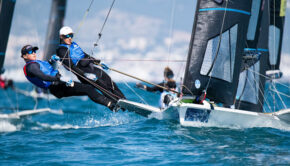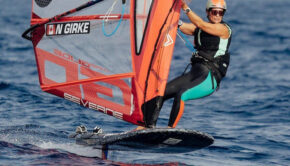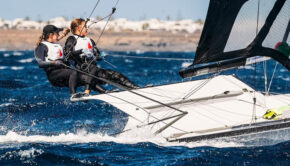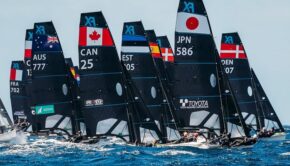Sail Canada: Olympic Selection and Future Direction
Published on June 28th, 2016
Scuttlebutt Sailing News has heard from people who are troubled that Canada is not sending a full team to the 2016 Olympic Games. Apparently Sail Canada has heard from them too. Here is a statement from Todd Irving, President of Sail Canada…
As we prepare to send members of the Canadian Sailing Team to Rio, I take this opportunity to provide an update on Sail Canada’s Olympic Selection Process and more generally, the future direction of our sport in Canada. We’ve appreciated hearing from those who are passionate about our country’s high performance sailing. With any change comes interest, concern and higher engagement.
To understand the selection process, it’s helpful to broaden the context to the 2008 Beijing and 2012 London Olympics. The results for Canadian Sailors and subsequent concern about lack of performance and downward trend at the Games called for action. There was significant sentiment expressed by our sailing community that Sail Canada (then CYA) needed to “up our game” and improve our Olympic performances. This was reinforced by the directives and funding support models coming from Sport Canada through Own the Podium (OTP).
As a result, we developed ‘Vision 2020’ in consultation with our stakeholders across the country. This plan was led by the Athlete Development Committee (ADC) and our National Team coaches. The focus of the program was towards performance over participation. This was to address the concern that we had become a nation of sailors who were more focused on getting to the Games than actually performing at them.
With much of the senior National Team retiring after 2012, Vision 2020 was established to redirect the culture of the national team to one of effort and pride in “wearing the jersey” and the success that represented. With limited resources, we consolidated efforts around select ‘supported’ classes in which we could establish a world-class daily training environment.
Training was centred on training groups with the critical mass to elevate performance, and employed greater coaching resources including a minimum 200 coached days on the water, in an effort to give us the best chance for improved performance in RIO 2016 and medal success by 2020.
The Laser, Laser Radial, 49er and 49er FX were the classes chosen to lead the way. And we all understood that there was no “silver bullet”; no quick solution. Other than under exceptional circumstances, changing direction and priority in any organization requires focus and support over an extended period of time.
Prior to this quadrennial, Olympic qualification was a relatively high bar which Canada often did not meet in all classes. Changes in philosophy and the approach to qualification emerged from the International Olympic Committee’s (IOC) desire to see all continents and a greater breadth of nations represented, especially developing nations. World Sailing (then ISAF) thus moved to a model that included regional qualifiers in each continent.
This move was made in consultation with the National Federations and was designed to ensure participation from developing nations and allow for better gender representation. With North America only represented by Canada and the United States in many classes, these changes had the unintended effect of enabling Canada to qualify in 9 of 10 classes with a few of them merely by virtue of registering for the Sailing World Cup Miami regatta.
The ADC developed Selection Criteria for the Games was published in April 2015 and communicated and clarified to the teams on multiple occasions. The intent of the criteria, given the push from Sail Canada’s stakeholders for excellence at the Games, was to ensure that the team Sail Canada sends to Rio de Janeiro and future Games is one that can compete with the field.
In making this determination, the ADC looked at evidence of results analyzed against the competitors at those events and the Olympic sailors competing from the other nations. As determined by the ‘Own the Podium’ model, the focus and priorities both in funding and coaching resources was given to the athletes who are tracking towards the greatest potential results at the games. The direction from the ADC, the Coaches, supported by the board and backed by OTP is one of performance over participation.
Additionally, the ADC and coaches are committed a long-term athlete development model that places developing athletes at events that are appropriate to their stage of development. Some of the sailors who qualified the country for the Rio Games in Miami, while they are terrific athletes with great promise, are at a stage of development quantifiably below that of the Olympic fleets.
Sail Canada is excited and confident in the team going to Rio. There have been strong performances from the 6 classes (comprised of 4 women and 5 men) in recent events. We are extremely proud of the progress these athletes continue to make and the relentless work ethic behind it, and there is great potential for podium success. The Paralympic team is also showing great promise and between the two events in Rio, medals are a very real goal.
In recent weeks, there have been four athlete appeals brought before the Sail Canada Board, one of which was allowed, three were denied and two were denied again at the SDRCC (Sport Dispute Resolution Centre of Canada). The latter was a legal proceeding; Sail Canada engaged legal counsel familiar with the process, as did the athletes involved. And all deliberations were based on an objective process and set of criteria that has been known, and in place, for some time.
Sail Canada is continuing to pursue coaching accreditations with the Canadian Olympic Committee (COC) for Rio to ensure that the team has the maximum support possible for the full period of the Games from August 6 to 22. We currently have 5 accreditations confirmed for on-the-water coaches with the potential for a couple more Training Venue Pass (TVP) accreditations restricted to supporting roles such as meteorology.
Additionally, the COC have appointed Sail Canada Communications Manager as a member of the COC mission team in the role of press attaché. In a transition period as we search for a new CEO, I have been offered a guest accreditation as President of our organization. This spot is unrelated to the sport allocations and is for a 5 day period late in the Games (Aug 14-18). I will take this opportunity to meet with High Performance Directors and Leaders from other sailing National authorities and World Sailing representatives.
It is often said that you cannot understand the Olympic Games unless you have been there to see it. With the amount of focus on this area of our sport from Sail Canada stakeholders, the perspective is an important one.
Future Direction:
As Sail Canada moves forward and beyond Rio 2016, we are in change mode. We are committed to continuous improvement. We are actively searching for a new CEO and a first-ever dedicated High Performance Director. We are enacting change based on a cross-Canada performance review, an audit, conducted in partnership with Own the Podium (OTP) which calls for a stronger system with structure, measurement and accountability. The results of this review were shared broadly at time of their full adoption by the Board.
We are focusing on the complete training and development system of our sailors from Opti to Olympics. Going forward, an athlete-centric, Sail Canada led system, supported by coaches and together with our partner clubs and provincial associations, will be delivered as a National Program. A focus on skill development, skill execution and coach enhancement will give us the right tools and metrics to achieve success on a more consistent basis. Olympic selection will be revisited with input from stakeholders.
These actions will help to earn more funding and more support from Sport Canada, COC and OTP. To support this effort we are formalizing a fundraising effort, sponsorship programs and have set goals around growth of our existing programs like CANSail. We encourage input and feedback at all points along the way. Please do not hesitate to reach out to staff or volunteers to see how your contributions and perspective can be shared.
We are one organization with our clubs and provincial associations focused on sailor development at all levels. Working together, we can create a culture of excellence.
MORE:
In conjunction with Canadian Olympic Committee, the official Olympic Sailing team announcement is scheduled for July 4, 2016. Sail Canada has previously announced the following Olympic event selections: Lee Parkhill (Laser), Tom Ramshaw (Finn), Brenda Bowskill (Laser Radial), Nikola Girke and Luke Ramsay (Nacra 17), Erin Rafuse and Danielle Boyd (49erFX), and Jacob and Graeme Saunders (Men’s 470). The Paralympic team announcement is scheduled for July 18, 2016.
Source: Sail Canada









 We’ll keep your information safe.
We’ll keep your information safe.